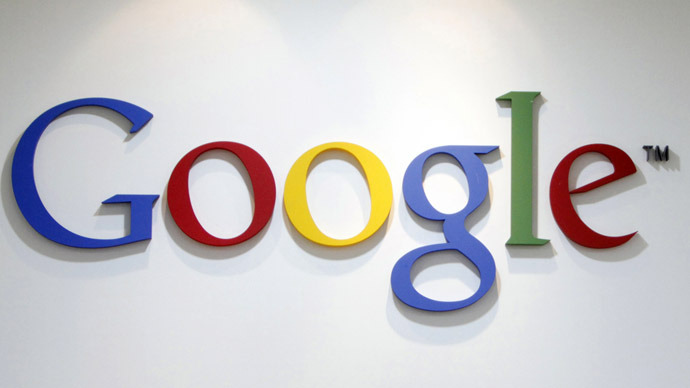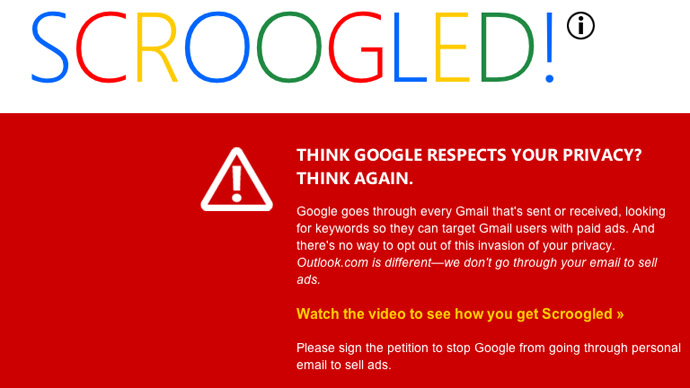Google's Gmail-reading ad service faces Russian privacy probe

Russian antimonopoly officials have launched an inquiry into Google for allegedly violating correspondence privacy in their advertising, Russian media reported. Google denied the charges, claiming that e-mails are reviewed by a computer, not a human.
Google’s webmail service Gmail will be investigated by Russia’s Federal Antimonopoly Service (FAS) for alleged unfair business practices and violating laws concerning the privacy of email correspondences, Izvestia daily revealed on Tuesday. The investigation was launched after multiple appeals by Russian citizens who were targeted by contextual advertising generated by Google’s web service engine, FAS representatives said.
FAS press chief Irina Kashunina confirmed to RT that experts at
the antimonopoly service are going to examine Gmail’s advertising
practices to verify whether Google has violated Russian law to gain
a competitive edge. The probe will most likely take at least one
month, she said.
Google’s mind-reader
Contextually targeted advertising is nothing new – initially, this technology used keywords that users had entered into the search engine. Google’s search engine advertising (SEA) now reads users’ emails automatically to fish out valuable information on what exactly the person is currently preoccupied with, or searching for.
Google’s office in Moscow did not deny that Gmail analyses its users’ emails: “It is the advertisement that enables us to provide services for free. We constantly work to make the ads safe, relevant and unobtrusive,” Google spokesperson Alla Zabrovskaya said. “Surely, there is nobody reading your mails or your account to pick up ads for you. It is automatic assessment algorithm similar to spam filtration that chooses ads.”
Gmail violates Russian law?
Google’s ‘mind-reading’ capabilities could violate Russian laws concerning the secrecy of private correspondence. Article 138 of Russia’s Criminal Code promises fines or corrective labor for “violation of secrecy of correspondence, telephone conversations, postal, telegraph, or other messages of citizens.” The use of “special technical means for secret collection of information” implies a maximum $10,000 fine, or up to four month behind bars.
In this case, a license agreement between Gmail and its clients cannot serve as an excuse for such practices, as long as the emails are a part of a Russian citizen’s private life, explained Sergey Kopylov, head of the legal department at Russia’s Internet Technical Center.
According to the Russian Civil Code, a license agreement is kind of contract; as long as a contract does not obey existing legislation, it must be considered void without any legal consequences, Kopylov told Izvestia.
Google vs Microsoft
This is not the first time Google comes under fire over suspicions it resorts to spying technologies. In 2010, many users expressed frustration at how the web giant placed ads around their personal communications in Gmail. Since then, the company has further mastered this advertising technique.
Google’s rivals couldn’t miss the opportunity to turn the controversial innovation against the Internet giant. In November 2012, Microsoft accused Google Shopping of delivering search results based not on relevance, but according to the amount the web stores pay to promote their goods. As an alternative, Microsoft proposed its own Bing Shopping search engine, a partner of eBay-owned Shopping.com.
On February 6, 2013, Microsoft launched an aggressive anti-Google marketing campaign with the website Scroogled.com, which lashes out at Google’s questionable business practices. “Think Google respects your privacy? Think again,” Scroogled.com says, pointing out that “Google goes through every Gmail that's sent or received, looking for keywords so they can target Gmail users with paid ads.”
Microsoft’s campaign is part of its efforts to promote its own Outlook email service, which Microsoft maintains does not violate users’ privacy. Microsoft has also asked users to sign a petition to stop Google from going through personal emails to sell ads. The company’s counter-campaign came after the web giant announced its Gmail service reached 425 million active monthly users in June 2012, surpassing Hotmail to become the world’s largest email service.

‘Using Gmail is your own choice’
Russia’s leading web companies that own mail services prefer to
keep a safe distance from anything that could be construed as
inspecting personal emails.
Russian internet giant Yandex believes that such privacy intrusion only irritates clients. And Mail.ru Group President Aleksey Katkov told Izvestia that his company does not use information from personal correspondences “for a number of reasons… We believe that kind of targeting [clients] is less effective than our own technologies,” Katkov said.
Russian MP Ilya Kostunov, an IT security expert, does not doubt that Google has violated correspondence secrecy laws: “Well, Internet companies do collect information about the users – but they do not read personal e-mails. I’m going to address to FAS so that they clear out if this is deceptive trade practice infringing the interests of Russian internet companies.”
Kostunov told Izvestia he is preparing legislation requiring civil servants to use only government webmail services for official correspondence, instead of using privately owned addresses registered at Gmail, Yandex or Mail.ru.
“I’d like to see inviolability of correspondence guaranteed by the state instead of Google,” he told Izvestia.
Kaspersky Lab Co-Founder and Director General of InfoWatch
Natalya Kasperskaya also does not doubt that Google has broken the
law, but explained that using Gmail is voluntary: “[Google’s
Gmail] is free for anybody. Don’t like it – don’t use it. But if
you do use it – be ready to be targeted with context ads. Your
personal data is going to be combined with data from other Google
services and analyzed. [Google Maps] will suggest your whereabouts.
The photos of you and your relatives will be found at Picasa
[Google’s photo hosting]. Your friends and acquaintances will be
tracked via Google+ [social network], your preferences can be
tracked by your web inquiries. The number of your credit card will
be known when you pay on Android market. The more Google services
you use – the less privacy you have left.”














